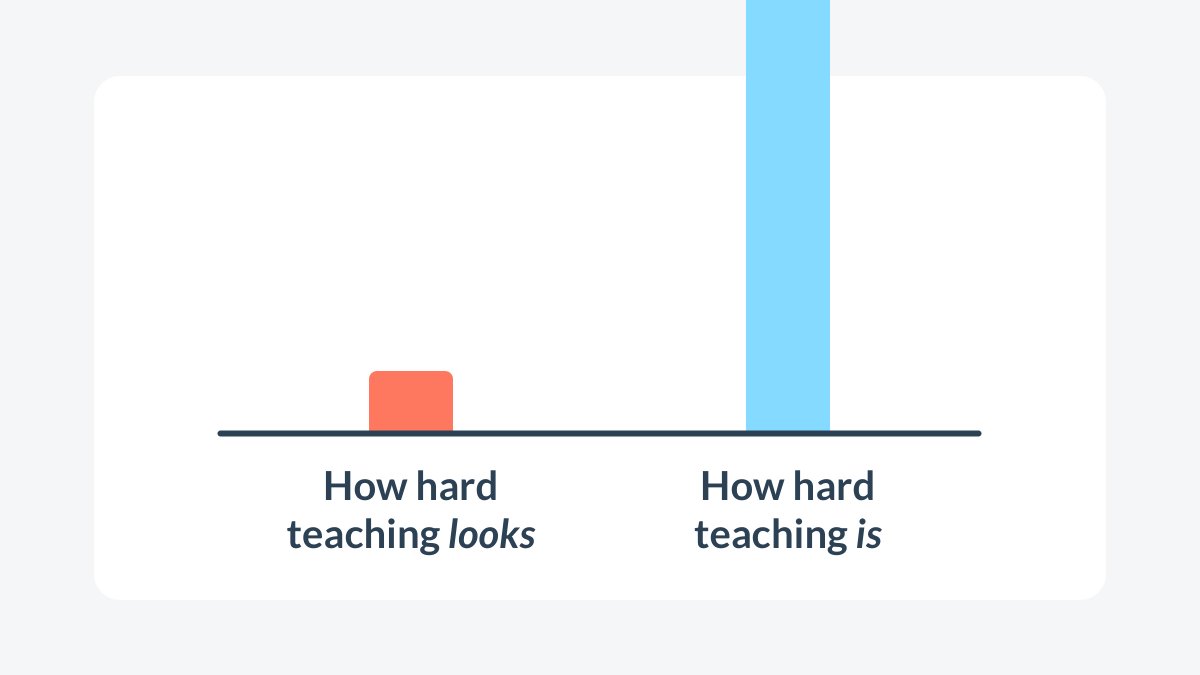'Theory' can all too easily be impotent in teacher development. However, done right, it can take teacher expertise to the *next level* 🚀
Over at Steplab, we've spent 200+ hours over the last year trying to crack this.
Here's what we've learned:
↓
Over at Steplab, we've spent 200+ hours over the last year trying to crack this.
Here's what we've learned:
↓
Now, in contrast to many other forms of teacher development, instructional coaching is pretty strong when it comes to driving behavioural change.
However, it doesn't always do a great job of supporting coaches & teachers with the theory side of things.
Why is this a problem?
However, it doesn't always do a great job of supporting coaches & teachers with the theory side of things.
Why is this a problem?
Well, theory is vital.
Particularly that which provides robust explanations of the vast sea of cause & effect in the classroom.
Without this, coaches & teachers risk over-focussing on replicating techniques, rather than building strong mental models of effective practice.
Particularly that which provides robust explanations of the vast sea of cause & effect in the classroom.
Without this, coaches & teachers risk over-focussing on replicating techniques, rather than building strong mental models of effective practice.
If we don't fully understand HOW a technique works and what PURPOSE it serves, we run the risk of using it at the wrong time or place...
AND it lowers our ability to adapt a technique for different classroom situations.
AND it lowers our ability to adapt a technique for different classroom situations.
EXAMPLE
Cold call is a great technique, but if you don't understand the theory underpinning it—that maximising thinking time leads to efficiencies and equity in learning
...it can end up being used when other techniques, such as call & response, might be more appropriate...
Cold call is a great technique, but if you don't understand the theory underpinning it—that maximising thinking time leads to efficiencies and equity in learning
...it can end up being used when other techniques, such as call & response, might be more appropriate...
...and it's less clear how teachers can flex the technique in response to a slightly different situation and still achieve the same outcome.
Such as failing to see that paired discussion or free recall can also be powerful ways to maximise thinking.
Such as failing to see that paired discussion or free recall can also be powerful ways to maximise thinking.
In short:
"There's nothing so practical as a good theory."
— Kurt Lewin
"There's nothing so practical as a good theory."
— Kurt Lewin
For all these reasons, we've been thinking hard over the last 12 months about how to integrate theory into the coaching process.
Here are some of the challenges we've come across and how we tackled them:
Here are some of the challenges we've come across and how we tackled them:
1/ Theory doesn't tend to fit so well with with the granular size of action steps.
However, it does fit with *groups* of steps which all serve a teaching 'goal', such as eliminating distractions, or using positive narration.
So → we've written modules for each of our 'goals'.
However, it does fit with *groups* of steps which all serve a teaching 'goal', such as eliminating distractions, or using positive narration.
So → we've written modules for each of our 'goals'.
2/ The coaching process is ready reasonably intense and so we've worked hard to keep everything super clear and actionable.
Each module includes:
→ Intro + model
→ Concise evidence summary
→ Multiple classroom case studies
→ Non-examples (to reduce lethal mutations)
Each module includes:
→ Intro + model
→ Concise evidence summary
→ Multiple classroom case studies
→ Non-examples (to reduce lethal mutations)

3/ Finally, some theoretical concepts can be quite abstract, and so we've crafted a visual for each goal to give teachers a further foothold towards understanding.
Here's a sample:




Here's a sample:




Combined, these strategies help teachers and coaches to integrate theory into coaching in efficient and flexible ways.
Over time, this helps teachers build robust mental models of effective teaching, and avoid lethal mutations.
⤵️
Over time, this helps teachers build robust mental models of effective teaching, and avoid lethal mutations.
⤵️
https://twitter.com/PepsMccrea/status/1641802559361802240
CAVEAT
Of course, theory by itself is not enough for effective teacher development... it must be combined with other essential ingredients, in what we might call 'balanced PD'.
⤵️
Of course, theory by itself is not enough for effective teacher development... it must be combined with other essential ingredients, in what we might call 'balanced PD'.
⤵️
https://twitter.com/PepsMccrea/status/1446475487316959243
And that's a wrap.
Our lead authors @HFletcherWood & @Josh_CPD have been putting the final study modules in place over the summer, and they're available to all @Steplab_co schools from TODAY 🥳
Let us know what you think :)
Our lead authors @HFletcherWood & @Josh_CPD have been putting the final study modules in place over the summer, and they're available to all @Steplab_co schools from TODAY 🥳
Let us know what you think :)
@HFletcherWood @Josh_CPD @Steplab_co And if you'd like to learn more about this project, just head over to:
👊steplab.co/resources/news…
👊steplab.co/resources/news…
• • •
Missing some Tweet in this thread? You can try to
force a refresh

 Read on Twitter
Read on Twitter









